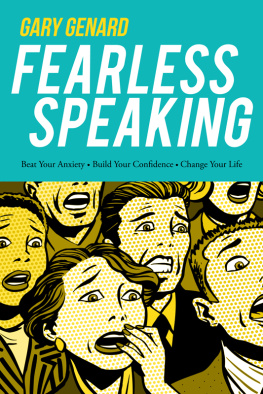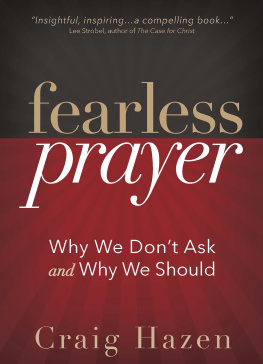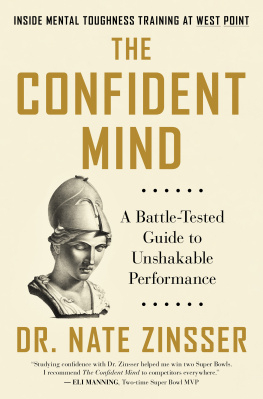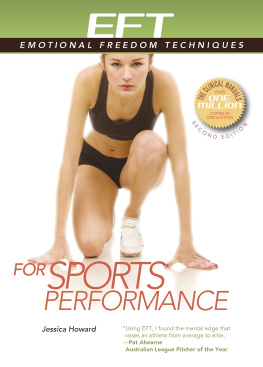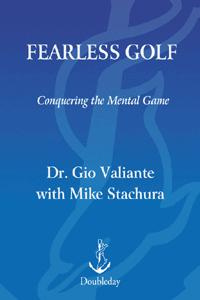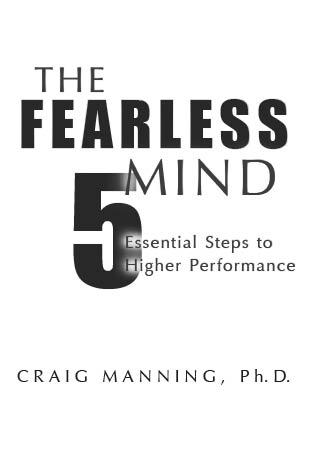Contents
Dr. Manning has dedicated his time, through years of research, to helping develop athletes minds to reach greater accomplishments and capabilities in not only their sports but in their daily lives. I have complete confidence in what he has taught me. Through countless hours of mentoring and coaching, I have become the player I am today and can only expect better accomplishments to come!
James Ludlow, Professional Tennis Player
Learning Craig Mannings insights into the world of sports psychology has helped me to develop techniques and life skills vital to performance on and off the ski hill. His coaching is key to helping me limit interference; elevate confidence, concentration, and motivation; and free my mind to become a fearless and successful athlete and human being. My personal experience of life and sports has taken on a new level of fulfillment, balance, and success.
Emily Cook, US Olympic Team
The skills I learned from this book helped me go from being a mediocre college athlete to one of the top three jumpers in NCAA.
Bobby Low, NCAA All-American, Professional Athlete,
Track and Field
For my wife, McKenzie
CFI
Springville, Utah
2009 Craig Manning
All rights reserved.
No part of this book may be reproduced in any form whatsoever, whether by graphic, visual, electronic, film, microfilm, tape recording, or any other means, without prior written permission of the publisher, except in the case of brief passages embodied in critical reviews and articles.
ISBN 13: 978-1-59955-396-2
Published by CFI, an imprint of Cedar Fort, Inc., 2373 W. 700 S., Springville, UT 84663
Distributed by Cedar Fort, Inc., www.cedarfort.com
Library of Congress Cataloging-in-Publication Data
Manning, Craig, 1970-
The fearless mind / Craig Manning.
p. cm.
ISBN 978-1-59955-396-2 (acid-free paper)
1. Success. 2. Fear. 3. Self-realization. I. Title.
BF637.S8M283 2010
158.1--dc22
2009048062
Cover design by Megan Whittier
Cover design 2009 by Lyle Mortimer
Edited and typeset by Kimiko M. Hammari
Printed in the United States of America
10 9 8 7 6 5 4 3 2
Printed on acid-free paper
The Journey of Life
Introduction
Not Inot anyone else can travel that road for you,
You must travel it for yourself.
Walt Whitman
In todays multitasking, text-messaging, highly sophisticated world, the pressure to perform is greater than ever. That being said, when all things are equalwhich they invariably are, thanks to modern-day technologythe mentally tough athlete, the businessperson, or the homemaker who has learned to harness the strength of the mind wins every time. Hence, this book is about learning to gain greater control over our minds to channel our energy in more productive ways. Life is a performance, whether we are on a court, in an office, running a home, or simply spending quality time with our children. We are always performing. If we control our minds, we can make our lives fulfilling.
Growing up in Australia, I loved playing sports of all kinds. I wasnt too interested in school and would get my homework done as quickly as possible to allow for more playing time. In my early teens, I realized I needed to focus on a particular sport if I was to try to make a career of it. I thought tennis would probably be my best bet. Although tennis was probably the sport at which I was the least skilled, I liked it the most, and I had an infrastructure within my family that greatly helped me improve my game (my dad was a great tennis player, my uncle was a coach by profession, and my cousin was very good and would later play professionally). I chose to channel all my attention on tennis.
I worked hard on my game and improved quickly. By the time I was almost eighteen, I decided to give it a go on the professional tennis tour. This really doesnt mean much; anyone can play pro tournaments at any point in time. All you have to do is sign up and pay the entry fee. I got accepted onto a private team made up of young Australian hopefuls. We traveled throughout Europe for nearly six months playing in tournaments, and I played in every pro tournament in Australia throughout the year.
My ultimate objective was to become the best tennis player in the world. However, from the time I was very young, I have always been a deep thinker, analyzing things, breaking things down, and trying to understand how everything works. I often pondered questions like, Why do people do what they do? or Why do some people perform so well while others struggle? I could never seem to shut off my mind. At times this was a major challenge, especially on the tennis court, and it resulted in more than my fair share of dismal performances. At other times, it was a great benefit, like when I persevered and completed a PhD in sports psychology. When I look back now, I realize a career as a professional tennis player wasnt in the cards for me.
But it was not until I was traveling through Europe playing pro tournaments that I realized I didnt enjoy tennis. You would think that traveling the world, living in a different city or even a different country from one week to the next would be a great way to live, but it just didnt suit me. I didnt enjoy living out of a suitcase, but more important, at the time, my mind was far from a fearless one.
My parents were footing the bill for my traveling experience, and I couldnt bear to see them sacrificing so much on the slight chance I might make it as a professional tennis player. It is a tough, grueling life trying to make a living on the pro tour. The third year I stayed home while my mates went back on tour. It was a bit of a rough year. I had always been so driven, but now I found myself careerless, jobless, and without much of anything to my name.
Tennis had been who I was; it had been my identity. Through high school I was known as Craig the tennis player. Without it I became lost and confused. I would ask questions of those who appeared to know themselves and their purpose in life: Why do you do this? Why do you do that? Yet I could never get an answer that made much sense to me. When I look back now, I realize I was looking for the deeper or real reasons why some succeed yet many fail. Meanwhile, I did whatever I could to keep myself busy, even completing a tax preparation course so I could work with my father, who owned his own accounting practice. I worked with my grandfather renovating one of his warehouses and taught tennis lessons. I ended up being very busy, but none of these professions seemed to fill the void inside me. After about six or seven months of running around in circles, the oddest thing happened.
I went away to a small country town tournament with some mates who werent really high-level tennis players but more social players. I hadnt played for a while, so I was a bit out of shape. The guys I was with recovered quickly from their matches, mainly because they didnt play too much tennis and usually lost pretty early in the tournament. I was good enough to do well at this level of competition and played tennis for two days straight. The combination of sleep deprivation from the silly tents we slept in and being out of match-shape wiped me out.
The day after we got back, I was to teach a tennis camp at the club where I trained while growing up. When I arrived, my mates father, the owner of the facility, said he wanted me to hit a few balls with a man who was in town for a veterans tournament. I was not feeling well at all. I had planned on toughing out the day and heading straight home to get some sleep. But since my mates dad told me this man was in his late forties, I thought, No worries. I will stand in one place and make him run around; he will be worn out in half an hour or so.


